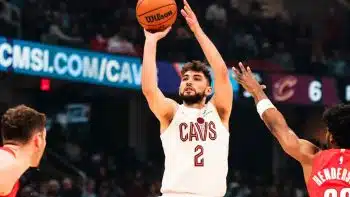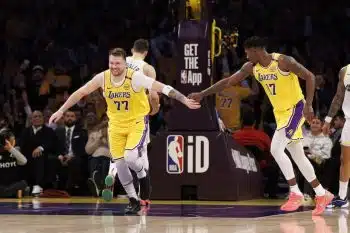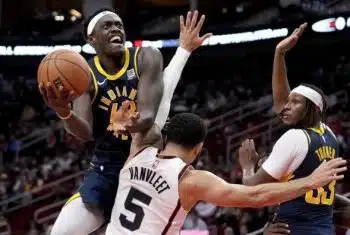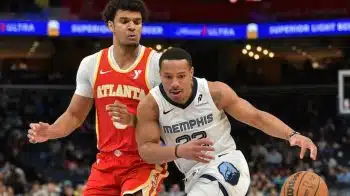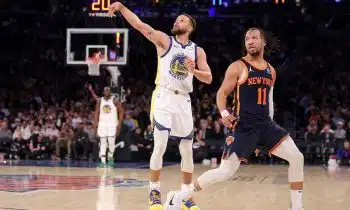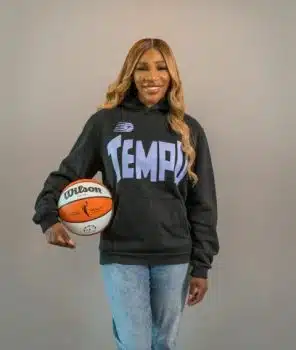NBA
NBA Daily: In Defense Of Carmelo Anthony
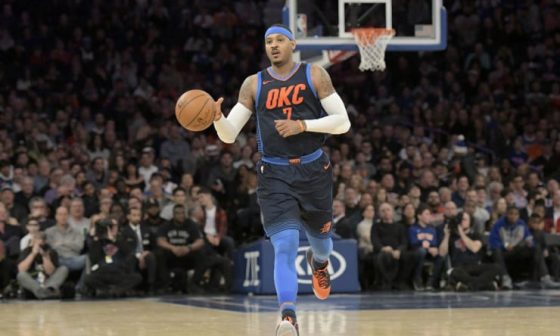
As the NBA Playoffs continue to gain momentum and pick up steam, this is a friendly reminder that two months from now, the league will undergo one of the biggest shake-ups in its storied history. Obviously, the free agency of four-time League MVP LeBron James will dominate the headlines and control most of the narrative once the signing war begins – and rightfully so. James is an all-time great and his decision on where he’ll spend the final years of his career will undoubtedly have a ripple effect on the league.
All-Star forward Paul George’s future will also impact the league’s hierarchy next season. Will George opt to stay in Oklahoma City after one year of teaming up with reigning league MVP Russell Westbrook in a campaign filled with inconsistency and underachievement? Or will George elect to pursue his reported dream of playing in Los Angeles for the Lakers?
Don’t forget to consider the developing story revolving around former NBA Finals MVP Kawhi Leonard and his suddenly tumultuous relationship with the San Antonio Spurs. Will the Spurs be forced explore Leonard’s trade value if the relationship is indeed irreparably damaged for good? If Leonard is placed on the trading block, will a team such as the Boston Celtics give up numerous pieces of their young core to make true title contention come quicker?
However, developing beneath the surface of all of those previous scenarios is the annual end of an era discussion. Will future Hall of Fame guard Dwyane Wade decide to hang the high tops up for good even though he’s still a relatively productive NBA player?
Similarly, this leads us down the road to what happens to a former All-Star and Hall of Famer named Carmelo Anthony.
Suffice it to say Anthony’s lone season in Oklahoma City didn’t turn out as expected. This was the first season since Carmelo Anthony entered the league in 2003 that he posted an average below 20 points per contest. It was obvious from the start, Anthony had trouble adjusting to being the third option on the Thunder. It was painfully obvious Anthony struggled playing power forward full time in the challenging Western Conference. It came as no surprise that Anthony allowed his frustration to show during numerous parts of the season while adjusting to the new role behind the younger George and Westbrook.
Since the Thunder were eliminated from the playoffs, the narrative has quickly morphed into Father Time finally catching up to Anthony, which has led to the discussion that it’s either time for Anthony to either hang up his high tops for good or bow out from considering himself a starting caliber player and be willing to accept a bench role.
One thing about NBA narratives are once they pick up steam they usually become concrete beliefs in many instances. But is the narrative regarding Anthony true?
During Anthony’s exit interviews he talked of the many sacrifices he made in order to make the trio of himself, George and Westbrook reach its potential. Those sacrifices included playing out of position, reduced minutes, giving up shot attempts, playing more off the ball in a limited fashion and for the first time in his career relinquishing his role as the top dog on a team.
While most in NBA fandom expect the transition to be easy, it is actually one of the toughest realizations for a player, especially a Hall of Fame player, to conclude. Players are sometimes the last to accept when they’ve lost a little bit of steam on their fastball and when it might be more beneficial to embrace a newer role. After all, this isn’t a video game. There are pride and ego aspects that come into play. Sometimes, the player is the last to know. Guys are used to being the man. They’re used to carrying the team. Their shear confidence in their own abilities often allowed them to defy the skeptics in order to get to the point where they are now.
This is similar to what’s going on with Anthony. He is no exception to the rule. Say what you will about Anthony, but he is a first-ballot Basketball Hall of Famer with a bullet. He won a national championship at Syracuse University and has three Olympic gold medals (and one bronze) to boast on his mantle. While Anthony’s NBA playoff success hasn’t been sparkling, his annual productivity on the floor has been – for a long time.
Let’s be clear, Anthony has lost a bit of zip on his fastball. He no longer can get by guys off the dribble consistently. He no longer dominates an opposing team’s shutdown strategy. He has not excelled as a catch-and-shoot marksman off the ball. Anthony has a player option worth $28 million for next season. Based on the disappointing year he endured, it is highly unlikely he gives this up to test his value in free agency. So naturally, the conversation has transitioned to whether Anthony, declining in skill, would be able to mentally accept a bench role in Oklahoma City.
To the surprise of no one, Anthony balked at the idea of coming off the bench for the Thunder during his exit interviews. Most following the game pointed to this commentary that Anthony was being selfish and not understanding where he is on his NBA Journey – which is near the tail end. Of course, this is the easy take to make. What the follow-up question should have been asked after Anthony laughed off the bench move idea, was exactly who on the current Thunder roster should he be coming off the bench for? This is the true essence of the dynamic when it comes to Anthony coming off the bench. Who would he be coming off the bench for and in what situation?
Most will point to Wade coming off the bench in Cleveland and Miami this season and seemingly accepting the new role as a veteran leader. But Wade has three titles on his shelf and is solidified on where his career is slotted.
Anthony, on the other hand, still has things to prove in his mind and wants to be a key contributor on a title contending team. Which is the reason why the question of Anthony, at this point at least, coming off the bench for the Thunder is relatively absurd. Just exactly who should Anthony come off the bench for in Oklahoma City as the roster stands today? Patrick Patterson? Jerami Grant? Nick Collison? Josh Huestis? It’s extremely easy to throw potshots at Anthony right now because he is a declining and fading star. It’s easy to sell the narrative of a top-level player that is losing their natural talent and declining should be jettisoned and willing to accept less.
But again, this isn’t a video game. If Anthony were to look behind him on the depth chart and see a young and emerging player that could help preserve him maybe, just maybe, his response to coming off the bench would be different. But with a collection of Patterson, Grant, Huestis and Collison behind him it will be harder for Thunder management to convince Anthony he should willingly concede his role further on the team.
